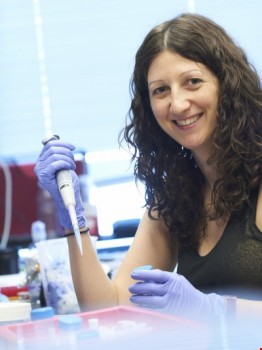Dr Barbara Tanos-Lora
 PhD
PhDBrunel University London
 United Kingdom
United Kingdombarbara.tanos@brunel.ac.uk
www.brunel.ac.uk/people/barbara-tanos-lora
Research Interests
A global nomad, Dr Barbara Tanos received her undergraduate degree from the University Buenos Aires, Argentina, and her PhD in Molecular Cancer Biology from Duke University in North Carolina. As a graduate student in the laboratory of Dr Ann Marie Pendergast, Dr Tanos became interested in how signal transduction pathways regulate basic biological processes such as the trafficking of growth factor receptors throughout the cell. During her graduate studies, Dr Tanos uncovered a novel role of Abl tyrosine kinases in inhibiting the internalisation of the epidermal growth factor receptor (EGFR) through specific phosphorylation of a tyrosine residue.
After receiving her PhD, Dr Tanos continued to study protein trafficking in the laboratory of Dr Enrique Rodriguez-Boulan, where she focused on the Ras effector IQGAP1 and its role in tight junction formation and maintenance.
In the last few years, Dr Tanos has expanded her interests in cell biological processes to include the study of centrosome biology and ciliogenesis, and has uncovered a new group of centriolar proteins required for cilia formation. She has shown that these proteins, known as distal appendage proteins (or DAPs), are required for centriole docking to the plasma membrane, and for the recruitment of specific proteins to the transition zone. Her work was published in a hallmark paper in Genes and Development.
Dr Tanos’s laboratory focuses on understanding the mechanisms of regulation of centrioles and cilia, how they function as signalling platforms, and what the consequences of their misregulation are in disease. Using a unique mix of expertise in signal transduction, biochemistry, cancer biology and cell biology she uses this information to find exploit therapeutically opportunities both for cancer and ciliopathies.
Work from the Tanos Lab, has been recently published in Cell Reports, describing a truly novel and fascinating story on the role of primary cilia in promoting resistance to a variety of cancer drugs:
https://www.cell.com/cell-reports/fulltext/S2211-1247(18)30749-6,
and was featured in the MRC and other news websites:
http://bpod.mrc.ac.uk/archive/2018/6/28,
https://www.icr.ac.uk/news-archive/stunting-cell-antennae-could-make-cancer-drugs-work-again.
and Dr. Tanos was interviewed on the radio,
http://news.radiojackie.com/2018/06/the-institute-of-cancer-research-in.html
Dr Tanos uses both gene editing and RNAi to switch the expression of proteins of interest on and off, as well as a number of microscopy and biochemical techniques to how centrioles and cilia function as signaling platforms. The ultimate goal is to understand how these processes are altered in disease and use this knowledge to identify novel therapeutic strategies.
